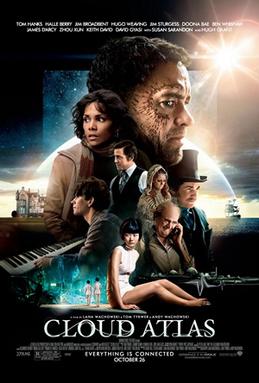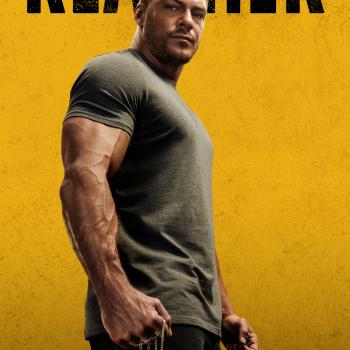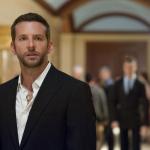Review of Cloud Atlas Directed by Tom Tykwer and the Wachowskis
By COYLE NEAL
Don’t let the title fool you—there is neither cartography nor meteorology in the latest entry in the “I read a philosophy book once” series of films by the Wachowski brothers siblings starship. As with their previous movies, Cloud Atlas contains a goodly mix of action, humor, fantastically imaginative settings, pseudo-philosophical one-liners, and Elrond. Weighing in at just under three hours, this lengthy tale is well worth your time—as long as you don’t take the film as seriously as it takes itself.

The overall point of the movie (and possibly the book too, though I haven’t read it) is that there are two ways of seeing human relationships in the world. You can see them as being based on power, with the strong dominating the weak through the establishment and reinforcement of the conventional order; or you can see them as being based on honest and loving relationships between authentic individuals. The latter sorts of relationships tear down conventions and last through time, connecting and benefiting all humanity and leading to a glorious future. These two ways of looking at the world are highlighted through six interwoven stories ranging from the early 19th century through the distant post-apocalyptic future. (I should point out that all of these stories would have made fine stand-alone movies—especially the one about the Professor Slughorn trying to escape the asylum.)
The theme that emerges through the movie is that power-based relationships establish and defend societal conventions in the name of order and peace, but in reality do nothing more than allow the strong to control and abuse the weak for their own benefit and pleasure. As an alternative, relationships based on love liberate us from these social conventions and unite us to each other in a connection that gives our lives definition and meaning. These latter kinds of relationships include (but are presumably not limited to): heterosexual love, homosexual love, friendship, trans-socioeconomic-boundaries-love, and art/literature. All of these are liberating and transformative ways of interacting with other people and living the full life that a human being is capable of.
Which pretty much shows us what the two major philosophical problems with the movie are going to be. First, this is a fairly shallow way to divide up the world. It’s essentially the pop-philosophy version of cowboys in white hats and cowboys in black hats as the good guys and bad guys, and ignores any kind of nuance or complexity. Agent Smith is simply going to brutalize you until you die and then move on to the next person, for no reason other than the pleasure and profit of those in charge. Meanwhile, Cast Away and Catwoman are going to lead the morally-superior-but-massively-outgunned-and-probably-going-to-lose rebellion against the system while we cheer them on. And frankly, I think that’s what most good movies should do—so long as they realize their own limitations. Cloud Atlas fails at this important caveat and never quite seems to understand that not only its plot but also its themes are mere caricatures of real life. While I generally enjoy—even prefer—films where good guys are unbendingly good and bad guys kick puppies and shove old people, when those movies try follow up with “and that’s how the real world could be/should be/is”, I get a bit suspicious that the filmmaker doesn’t actually know much about the real world. That being said, I don’t know how I would have changed it without taking away from what makes Wachowski movies generally a delight to watch. If the characters had been more complex and the theme more realistic, I probably would have complained about the movie being not enough of a movie and more like real life—which I don’t particularly care to pay $10 to see. Maybe the point of all this is that Cloud Atlas was too preachy in a way I disagree with (albeit in a way that was nonetheless entertaining).
Second—and much more important than the rambling first objection—the absolute dismissal of all social convention as oppressive is frankly silly, and not a terribly useful contribution to the discussion of how we should see the world and have loving relationships with each other. Leaving aside the question of whether this idea is an outgrowth of the Wachowskis’ bizarre personal life, even a cursory glance at society with one eye closed and a drop of grapefruit juice in the other shows that “convention” is something of mixed value. While I won’t go as far as to say that convention should be defended at all costs (as some mistaken conservatives have done), I will suggest that if you can’t understand why we need some basic assumptions that we all agree on to maintain some level of order in society, you’re probably not a terribly thoughtful individual. This isn’t to say that all conventions are good (or even most of them), it is to say that they can be blessings in their proper place. For example, I happen to think it’s a good thing that we have a convention in America that says Fascism is bad and that freedom of speech is good. And I don’t care what the Wachowskis have to say about it, I will defend that particular convention (and a good number of others) as being a positive force in society.
Even more, as Christians we believe that conventions are necessary for social order for the simple reason that without some form of external restraint, people’s internal desires would be unleashed and all the evils of the human heart would pour out into the world. And while convention cannot cure the problem of the sinful heart (only the Gospel and the forgiveness that comes through the cross can do that), it can act as a common grace gift of God and restrain those wicked impulses. When someone cuts us off in traffic, we don’t force them off the road in part because there are conventional consequences for doing so. Heck, with a healthy body of conventions we could potentially even have fewer people cutting each other off…
Even with these philosophical weaknesses, you should go see this movie. As mentioned above, the Wachowskis have created a world (several of them, really) full of wonder and delight and which captivates and delights the imagination. Better yet, Tom Hanks, Jim Broadbent, and Hugh Grant are amazing in their various roles—it is worth the price of admission alone to see what they do with those three actors.
Disclaimer: it takes about an hour before you start to get some idea of just what the heck is going on in the movie.
Coyle Neal lives in Washington, DC, where he enjoys the fine art of reading books in coffee shops while he avoids grading papers.












